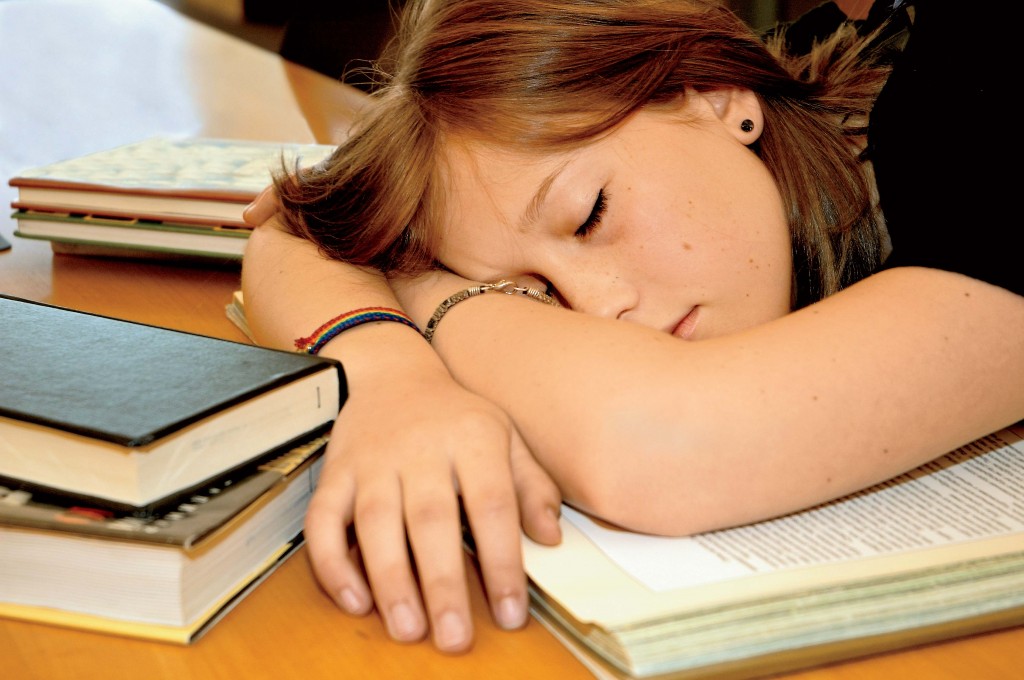Tired Teens – How to Combat Sleep Deprivation
By Mary Kay Kleist
March 2013 View more Health & Fitness
 Let’s face it, We all function better after a good night’s sleep. With over-packed schedules, late-night activities, and early classes, more and more teenagers are physically and mentally exhausted. Medical experts say growing teens need about 9.25 hours of sleep every night. According to a National Sleep Foundation poll, only one in five teenagers get a full night’s sleep. This can negatively affect school performance, driving ability, and their mood.
Let’s face it, We all function better after a good night’s sleep. With over-packed schedules, late-night activities, and early classes, more and more teenagers are physically and mentally exhausted. Medical experts say growing teens need about 9.25 hours of sleep every night. According to a National Sleep Foundation poll, only one in five teenagers get a full night’s sleep. This can negatively affect school performance, driving ability, and their mood.
The Ticking Biological Clock
It’s normal for teens to want to stay up late and sleep in, because they have a different biological clock than adults. When puberty hits, there’s a shift in their sleep-wake cycle. For growing teens, the brain hormone associated with sleep, melatonin, is secreted much later in the evening. This causes teens to stay up later, but due to busy schedules, they can’t always sleep-in the next morning. Without proper sleep, they could experience mood changes, depression, and obesity. “Sleep deprived teenagers can be at a higher risk for infection, as sleep deprivation can affect body immune mechanisms,” said Dr. Hari Bandla, University of Chicago pediatric sleep specialist.
Lights Out… Phones Off
A Pew Internet survey found that 86 percent of older teens sleep with their cell phones. Late night electronic use can rob teens of quality sleep, making them crabby, argumentative, and unfocused in class. “Electronic devices that emit bright light inhibit melatonin secretion, thus delaying sleep. Social media exposure via the Internet, communication via cellphone, or by text messaging are excitatory to the brain, thus compromises the need for a relaxing environment for initiation of sleep,” said Dr. Bandla.
Broken Sleep
Deep sleep occurs in the first three to four hours of your sleep. If that sleep is broken, it can affect grades. “First, you have to be well rested to engage in the early stages of learning, such as focusing attention on new material and using higher-order mental processing to process the material fully. Second, sleep is critical after learning new information. There is rich evidence that the brain processes and reprocesses new information during nighttime sleep, to the benefit of long-term retention. Third, being well-rested makes it easier to recall or recognize previously learned information on demand,” said Dr. James Wyatt, director of the Sleep Disorders Service and Research Center at Rush University Medical Center.
Weekend Catch-Up?
Many teens try to catch up on their sleep over the weekend, but it can be difficult to erase sleep debt. “For example, if a teenager loses two hours of sleep over the weekdays, total cumulative sleep debt is 10 hours. It’s difficult to catch up on 10 hours of sleep in two days (48 hours). As a consequence, sleep debt continues into the following week,” said Dr. Bandla. Teens who sleep away the weekend may have an even harder time waking up for school Monday. Their circadian clock may shift by nearly an hour, making Monday morning feel like mild jet lag.
Expert Advice
“The normal time required to fall asleep at night is somewhere between 10 and 30 minutes. Falling asleep when your head hits the pillow is a warning sign of excessive sleepiness. Requiring longer than 30 minutes to fall asleep is also a warning sign,” said Dr. Wyatt. Experts say it’s best for teens to keep a regular bed and wake time. Consider cutting off electronic devices one hour before bed. Charge all cell phones on the kitchen counter at night. Limit hours working or playing sports. Abd no caffeine after 3 p.m.
“When simple changes are not enough, checking with the family physician is the next step. Nearly all cases of insomnia are easily treated by sleep specialists,” said Dr. Wyatt.





